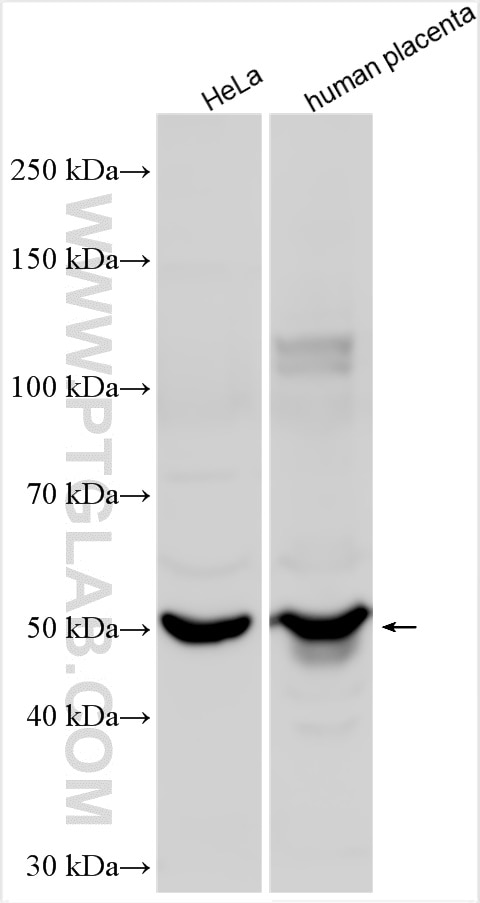Anticorps Polyclonal de lapin anti-PILRA
PILRA Polyclonal Antibody for WB, ELISA
Hôte / Isotype
Lapin / IgG
Réactivité testée
Humain
Applications
WB, ELISA
Conjugaison
Non conjugué
N° de cat : 11818-1-AP
Synonymes
Galerie de données de validation
Applications testées
| Résultats positifs en WB | cellules HeLa, tissu placentaire humain |
Dilution recommandée
| Application | Dilution |
|---|---|
| Western Blot (WB) | WB : 1:500-1:2000 |
| It is recommended that this reagent should be titrated in each testing system to obtain optimal results. | |
| Sample-dependent, check data in validation data gallery | |
Informations sur le produit
11818-1-AP cible PILRA dans les applications de WB, ELISA et montre une réactivité avec des échantillons Humain
| Réactivité | Humain |
| Hôte / Isotype | Lapin / IgG |
| Clonalité | Polyclonal |
| Type | Anticorps |
| Immunogène | PILRA Protéine recombinante Ag2385 |
| Nom complet | paired immunoglobin-like type 2 receptor alpha |
| Masse moléculaire calculée | 303 aa, 34 kDa |
| Poids moléculaire observé | 50 kDa |
| Numéro d’acquisition GenBank | BC017812 |
| Symbole du gène | PILRA |
| Identification du gène (NCBI) | 29992 |
| Conjugaison | Non conjugué |
| Forme | Liquide |
| Méthode de purification | Purification par affinité contre l'antigène |
| Tampon de stockage | PBS avec azoture de sodium à 0,02 % et glycérol à 50 % pH 7,3 |
| Conditions de stockage | Stocker à -20°C. Stable pendant un an après l'expédition. L'aliquotage n'est pas nécessaire pour le stockage à -20oC Les 20ul contiennent 0,1% de BSA. |
Informations générales
Paired receptors consist of highly related activating and inhibitory receptors and are widely involved in the regulation of the immune system. Paired immunoglobulin-like type 2 receptor alpha (PILRα) and PILRβ are paired receptors bearing highly similar extracellular ligand-binding domains but divergent intracellular signaling domains. PILRα is the immune inhibitory receptor possessing an immunoreceptor tyrosine-based inhibitory motif (ITIM) in its cytoplasmic domain enabling it to deliver inhibitory signals. Binding of PILRα to its ligand CD99 is involved in immune regulation. PILRα can also recognize other ligands, PILR-associating neural protein (PANP), and HSV-1 glycoprotein B (HSV-1 gB). PILRα has a calculated molecular weight of 34 kDa. It has been reported that PILRα migrates at 44-50 kDa due to glycosylation (PMID: 10903717; 10660620). The other band of about 61 kDa detected by this antibody may present a heavily glycosylated form of PILRα.
Protocole
| Product Specific Protocols | |
|---|---|
| WB protocol for PILRA antibody 11818-1-AP | Download protocol |
| Standard Protocols | |
|---|---|
| Click here to view our Standard Protocols |


